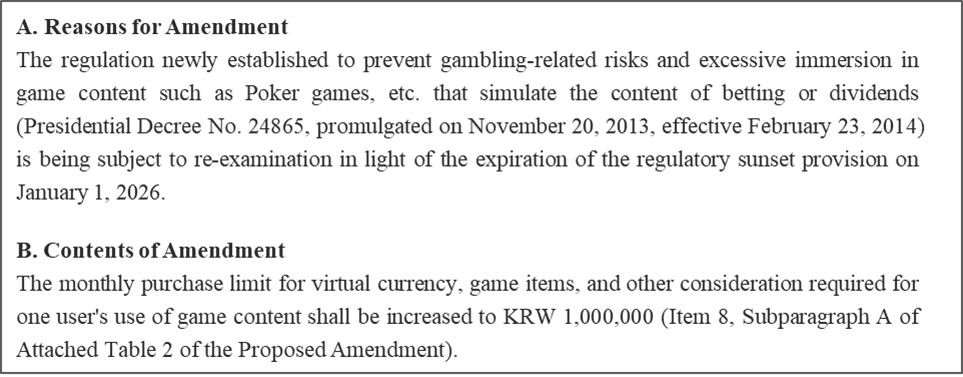본문
Game law Update: Proposed Amendment to the Enforcement Decree of the Game Industry Promotion Act
- Newsletters
- 2025.11.28
The Ministry of Culture, Sports and Tourism announced the proposed amendment to the Enforcement Decree of the Game Industry Promotion Act on November 20, 2025 (the “Proposed Amendment”). Reflecting the results of the government's sunset review conducted in anticipation of the expiration of the regulatory sunset provision scheduled for January 1, 2026, the proposed amendment focuses on increasing the monthly purchase limit for web board games (i.e., games simulating the content of betting or dividends like online poker games, etc.) from the existing KRW 700,000 to KRW 1,000,000.
The Proposed Amendment merits particular attention in that it transcends a mere adjustment of payment limits and represents the result of seeking a balanced point between the promotion of free leisure consumption by adults and the appropriateness of service management.
This newsletter (i) examines the background and principal contents of the Proposed Amendment, (ii) examines the significance of the sunset review, and (iii) assesses the potential impact on the gaming industry.
1. Background
2. Principal Contents of the Proposed Amendment to the Enforcement Decree of the GIPA
3. Implications
1. Background
The Ministry of Culture, Sports and Tourism announced the Proposed Amendment on November 20, 2025, and the Proposed Amendment was published in the Official Gazette, with the period for soliciting comments set until December 30, 2025.
Enforcement Decree of the current Game Industry Promotion Act (“GIPA”) and some items of this Enforcement Decree with which web board game operators should comply has been subject to a "sunset review regarding regulations every two years since the regulation was first established in 2014. The Proposed Amendment is announced following the sunset review conducted by the regulatory authorities in anticipation of the expiration of the regulatory sunset provision on January 1, 2026.”
2. Principal Contents of the Proposed Amendment to the Enforcement Decree of the GIPA
The key contents of the Proposed Amendment are clearly set forth in the statement of legislative purpose.

3. Implications
A. Sunset Review Regarding "Game Regulation"
The relevant provision of this Attached Table of the Enforcement Decree constituted a regulation focused on web board games. Sunset review is premised on examining the necessity of regulations within a prescribed period and, where necessity is not recognized, allowing the regulation to expire.
Over the past ten years, the regulation in this Attached Table of the Enforcement Decree has exhibited multifaceted transformation. Overall, while demonstrating a tendency toward relaxation of payment limits, it has simultaneously shown an increase in so-called "soft law" regulations, such as mandatory consultations with regulatory authorities.
The Proposed Amendment focuses on the relaxation of payment limits for regulated game content. Specifically, the core content of Proposed Amendment consists of upward adjustment of the current payment limit from KRW 700,000 to KRW 1,000,000.
B. Sunset Review Regarding De Facto "Adult Leisure Consumption Regulation"
It is exceedingly rare to find precedent for the government establishing payment limits for adults by statutory law in connection with the purchase and use of goods and services. In principle, adults may engage in unrestricted consumption in all areas of life, work, and leisure. However, in the context of game services, such consumption cannot exceed the regulations applicable to game companies.
This is because if a game company provides services in violation of the payment limit, it faces severe penalties including suspension of operations and criminal prosecution. Consequently, while the direct purpose of the GIPA concerns the regulation of game companies, its practical effect is that the government imposes constraints on free leisure consumption by adults.
It was precisely this structural consideration that led this regulation, beginning in 2014, to be established as a "sunset regulation" subject to sunset review every two years. Accordingly, the present proposed amendment reflects the result of the regulatory authority's examination that, beginning in 2026, operating with a relaxed payment limit of approximately KRW 1,000,000 would be appropriate as a policy direction of the Ministry of Culture, Sports and Tourism regarding adult leisure consumption.
C. Necessity of Relaxation and Appropriateness of Management
It is reasonable to infer that the policy authorities have made a balanced judgment between the “necessity” of regulatory relaxation and the “appropriateness” of service management.
First, the promotion of free leisure consumption by adults constitutes the foundation for development of the service industry; therefore, the “necessity” of relaxation is likely to have been widely recognized. Furthermore, since the implementation of regulations in 2014, game companies, the Game User Protection Center, and regulatory authorities have consistently expanded the scope of service management through collaboration. As a result, at the present time, approaching 2026, it appears that management capacity regarding Web board game services has reached a level capable of “appropriately” managing adult Web board game consumption at a monthly level of KRW 1,000,000.
Ultimately, the present proposed amendment may be evaluated as the product of comprehensive review of both the ”necessity” of regulatory relaxation and the ”appropriateness” of service management.
D. Concluding Remarks
Korea's game regulation possesses the structural characteristic of necessarily improving in alignment with global standards while simultaneously responding to the standards and expectations of Korean society.
The paradigmatic example is regulation regarding web board games—that is, games simulating the content of betting or dividends. By global standards, it is difficult to find justification for imposing statutory constraints on adult users of this genre of game content. However, by the standards of Korean society, both in the initial process of introducing regulations and in biennial sunset review examinations, stringent criteria have consistently been required.
Observing the sunset review regarding this regulation over the past decade, one may conclude that Korean regulatory authorities now carefully balance societal benefits and harms in reaching conclusions regarding the necessity of regulatory relaxation and the appropriateness of management. This represents a juncture at which trust in regulatory operations is being formed and, moreover, constitutes a significant step forward in establishing global trust in Korea's GIPA, which must be observed by foreign game companies as well.
Yoon&Yang Game Center consists of professionals and experts with rich practical experience in relevant bodies, specializing in the game industry. We proactively monitor issues and are ready to respond quickly to all legal matters regarding the game sector. For inquiries, please contact us at any time.
- Practice Areas
- #Game Center






